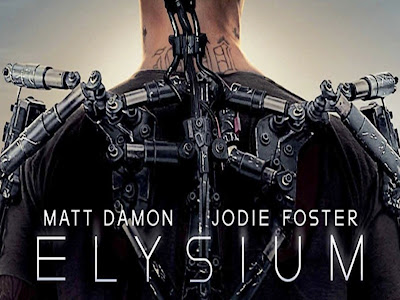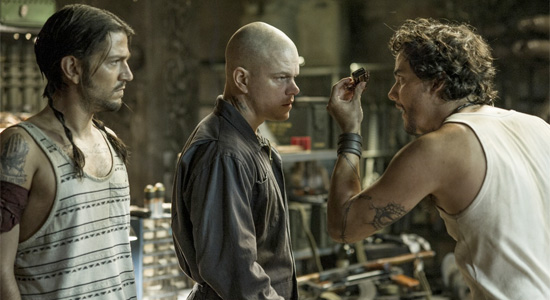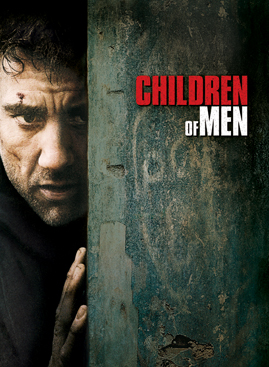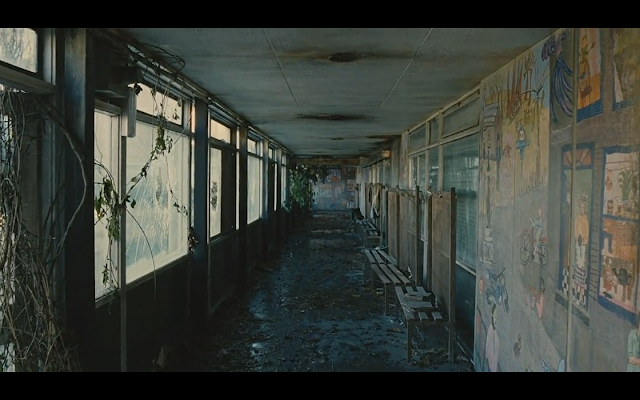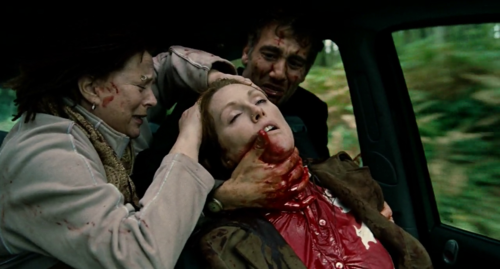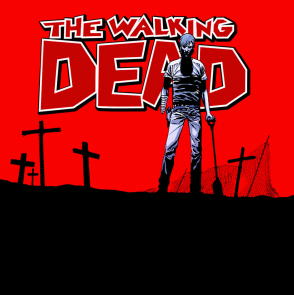*Spoiler Alert*
If you’re at all like me, you’re constantly frustrated by the characterizations of the women of
The Walking Dead AMC series, their choices, and their actions. The show has received significant criticism for its paternalistic attitude, its throwback gender roles, and its lack of strong, capable female characters. Though the current season (Season 3) has made some positive changes with the greater development of Maggie, Andrea, and Carol as well as the addition of the samurai sword-wielding Michonne, a lot is left to be desired. As a huge fan of the sometimes flawed, but overall intelligent and compelling
graphic novel series by Robert Kirkman, I feel it is my duty to show you what you’re missing. Through a comparison of the women of
The Walking Dead comic and TV series, it’ll become clear that the negative and weak representations of women are conscious, deliberate choices that the writers of the show have made in a departure from the original source material of the comic series.
Let’s start with Lori Grimes, the pregnant wife of Rick and mother of Carl who dies in childbirth in Season 3 of the TV series.
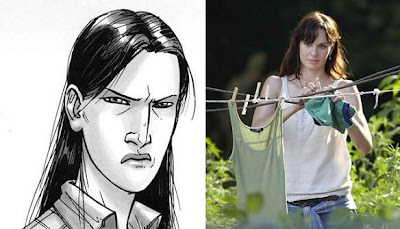 |
| Yes, TV Lori does a lot of laundry & traditional “woman’s work.” |
Lori has an affair with Shane, Rick’s best friend, when she’s under the impression Rick died during the zombie outbreak. Interestingly enough, the TV Lori is given far more reason to believe Rick is dead because Shane lies to her, telling her he saw Rick die. In the comic, she, like most people, can’t realistically hope that loved ones survived the outbreak, especially because Rick was comatose in a hospital. Despite the fact that she is given ample validation for seeking comfort in the arms of a long loved and trusted friend, TV Lori is consistently villainized. Her character is unlikeable, weak-willed, flighty, and she refuses to take a stance on important issues for her group, then blames others when things don’t work out. In fact, she Lady Macbeths (that’s a verb now) Rick and Shane into fighting over her to the death. Shane dies very early on in the comic series, and his beef with Rick is only partially his rabid love of Lori (the rest being their fundamental disagreement concerning how best to protect the group as well as Shane’s growing mental unbalance).
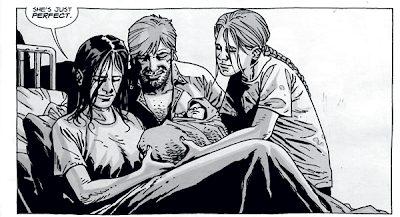 |
| Together, comic Lori & Rick look adoringly upon their new baby |
Though Lori wasn’t my favorite character in the comics, we empathize with her affair, and her bond with Rick is cemented and deepened when they choose together to raise the baby she’s carrying as their own, regardless of its parentage. Her TV pregnancy and resulting death in childbirth are punishment for her affair and for the continued implication that she’s a bad mother to Carl. It seems the writers believed that the only way for Rick and the viewers to forgive Lori was to have her die in unspeakable pain; she is given a C-section with a dirty pocket knife and no anesthetic in a dingy basement. The only way for her to redeem herself, they seemed to think, was for her to selflessly sacrifice her life for that of her infant. In the comic, Lori lives through childbirth along with the infant, Judith, and they die together during an attack upon the prison that proves to be a bloodbath. Comic Lori’s death is shocking and tragic, revealing to the readers that no one is safe in the most visceral way imaginable. Her death in its chaotic meaninglessness becomes the most meaningful death in the entire series thus far.
Then there’s the badass Michonne who is deadly with a katana blade and makes her first appearance during the season finale of the TV show’s second season.
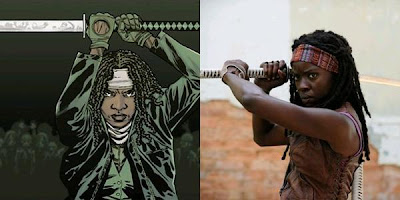 |
| Both Michonnes are gallows serious & stone-cold warriors |
Luckily, there’s not too terribly much different between the comic and TV Michonne characters…yet. TV’s Michonne is even more laconic and untrusting than her comic counterpart, though. Comic Michonne is obviously intelligent and admits to being a lawyer before the outbreak. She also suffers from some schizophrenic tendencies as a result of enduring the harsh road alone for so long (she hears the voice of and talks to her dead boyfriend). Unlike her TV version, comic Michonne knows she needs Rick’s group to keep her sane and to fight back those symptoms of mental instability she experiences early on. Her fierce independence is tempered then by a knowledge that working together with a group is the only way to survive and thrive. I’m seeing tendencies, however, in her TV version toward an almost debilitating anti-authoritarianism and a propensity to go rogue. This is evinced by her inability to “play nice” with the Governor even just to find out answers as well as her separating from the Rick group during their raid on Woodbury in order to exact her personal revenge. Her behavior makes Rick eager to send her packing, unlike in the comic where she is one of the most valued members of the group upon whom Rick relies always.
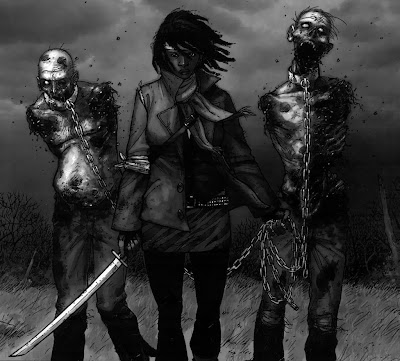 |
| So, so much badassery |
Her introduction to the Rick group on the TV show is problematic in the way that it diverges from her comic introduction. TV Michonne shows up at the prison badly injured, falling unconscious from her wounds after an impressive display of her skill at dispatching walkers. As the remaining walkers descend upon her inert form, the Rick group rushes to save her and treat her wounds. When she regains consciousness, she growls to Rick, “I didn’t ask for your help,” which is, of course, ridiculous because we all know she would have died without it; this is more of that display of self-destructive anti-authoritarianism. In the comic, she rescues Otis (yup, he’s still alive at the prison) from a zombie horde. Otis vouches for her, which gains her entry into the prison and the basic trust of the group. Instead of joining the group as a valued, proven member as she did in the comic, TV Michonne remains of questionable trustworthiness and is immediately indebted to Rick, his rescue of her a display of innate dominance. Even the fact that she rescued and cared for Andrea for months in the series becomes a strange downplay of her comic rescue of a male member of the group, as if the life of Andrea, a woman, isn’t as worthy as the life of Otis, a man.
Finally, we have Andrea. Tsk. Tsk. Andrea, Andrea, Andrea. Sigh.
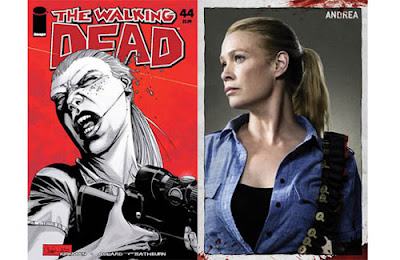 |
| I promise you’re missing so much Andrea awesome if you don’t read the comic |
The paths of TV and comic Andrea are unrecognizably dissimilar, and her character, more than any other, proves that the TV writers cannot bring themselves to fully empower a female character. TV Andrea claims to be a good shot, but we have no evidence of it…other than her shooting Daryl instead of a walker. She is suicidal for quite some time, randomly sleeps with Shane, and ends up being sheltered and protected by Michonne for months as she recovers from sickness. Not only that, but she ends up ignoring Michonne’s warnings about Woodbury and having an affair with the psychotic Governor. In the most recent episode “The Suicide King,” the Governor’s unjustifiably erratic and cruel behavior becomes obvious even to Andrea (pitting brothers against each other in a fight to the death, admitting that he held Glen and Maggie without telling Andrea, and refusing to provide much needed leadership to the community he built). Andrea says to him, “Don’t push me away. Not now.” With my eyebrows climbing all the way to my occipital lobe, all I could think was, “Girl, why aren’t you running for the hills?!” TV Andrea lacks self-esteem and is consistently making bad choices with regards to men as well as her own safety. She takes orders from the Governor even though she knows better and can’t seem to realize, despite a plethora of evidence, that the Governor is simply bad news bears.
Now comic Andrea’s badassery rivals that of Michonne.
 |
| Blam, Blam, Blam is right |
Between comic Glen and Andrea, I’m not sure which of them is the MVP of the group, both having a skillset that would be really difficult to train into a replacement. Glen’s ability to hide, scavenge, and stealth his way past walkers may actually be trumped by Andrea’s uncanny sharpshooting talents. She saves the group on countless occasions, and she’s the real reason why the body count after the prison raid wasn’t 100%, as she stood up in the guard tower picking off attackers like they were soda cans at a carnival. The scar across her freckled face is a manifestation of the toughness and survival instinct that defines her character. Not only that, but she
does not have an affair with the repugnant Governor; her romantic relationship is with a much more likeable comic Dale. The two form a unique and lasting bond that brings them both solace amidst unspeakable loss and terror. They are together until Dale dies.
Comic Andrea is always an asset and never a liability to the group. Her stalwart character is too robust, too invaluable for the TV writers to translate to the screen, so they undercut her at every opportunity in a blatant attempt to make her weak, dense, and unlikeable to the audience. Both Michonne and Lori suffer similar fates in that many of their finer qualities of strength, perseverance, and cooperation are lost in translation. It’s hard to see these changes as anything less than the creators of AMC’s The Walking Dead being threatened by or at least incredulous at the prospect of powerful female characters. For any of you who think they make these changes for the sake of drama, I’ll tell you a little anecdote. I once had a friend who said, “I want to watch a horror movie where the characters do all the right things; they’re smart and skilled, and shit still goes sideways.” For the most part, that is the case with the graphic novel series. It’s a page-turner, a gut-wrencher, a heartbreaker, and without fail all the characters are more well-rounded, empathetic, and ass-kicking than their TV counterparts. The drama is in those pages, along with plenty of strong women. I hate to say this, but the writers need to STOP being “creative” and stick to the complex, morally fascinating dystopian story that inspired the series.
